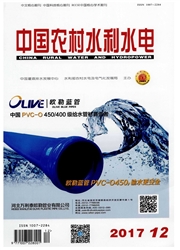

 中文摘要:
中文摘要:
针对以往区域地下水研究中忽视系统复杂性,致使分析结果不合理的弊端,以Kolmogorov熵定义系统的复杂性,采用建三江分局15个农场1997--2010年逐月地下水埋深观测资料,基于遗传编程(GP)算法对各农场地下水系统复杂度进行了计算,确定了复杂性排序,复杂性分析结果显示:七星农场复杂性最强,其次为浓江农场,二道河农场复杂性最弱,且建三江分局地下水系统复杂性呈现北部偏高、中部偏低、南部居中的分区特征。同时引入EMD—RBF神经网络模型,以Kolmogorov熵计算结果为依据,进一步探讨了系统复杂性对于模型预测精度的影响,指出复杂性与模型预测精度存在相关性关系,并对地下水预测模型的研究提出了建议,指出可以将复杂度作为建模参考因子。研究结果为现有预测模型的改进以及新方法的提出提供了参考,为区域地下水资源的科学管理乃至农业的可持续发展提供了科学依据。
 英文摘要:
英文摘要:
According to the malpractice of ignoring the complexity of the system for the past in the regional groundwater studies to cause the unreasonable analysis of the results, we have defined the complexity of the system by using Kolmogorov entropy, adopting monthly groundwater depth monitoring data in 15 farms of Jiansanjiang Branch Bureau, calculated the complexity of groundwater systems on farms based on Genetic Programming(GP) algorithm, and confirmed the order of complexity, the complexity analysis re- sults show that, the complexity of Qixing Farm is the most serious, followed by Nongjiang Farm, and the complexity of Erdaohe Farm is the weakest, the characters of monthly groundwater depth series complexities are that the largest is the north subarea, the lowest is the middle subarea and the middle is the south subarea in Jiansanjiang Branch Bureau. And by taking the complexity calcu- lation, the EMD-RBFNN model is introduced. Then we have further explored the influence of system complexity on the model pre- diction precision, pointed out that correlation between complexity and the model prediction precision is existence, and made sugges- tions for the research on groundwater prediction model, pointed out that the complexity can be as a modeling reference factor. The re- search achievements provide a reference for improvement of existing predictive models. We have proposed a new method, and provid- ed scientific evidence for the scientific management of regional groundwater resources as well as the sustainable development of agriculture.
 同期刊论文项目
同期刊论文项目
 同项目期刊论文
同项目期刊论文
 Diagnostic Complexity of Regional Groundwater Resources System Based on time series fractal dimensio
Diagnostic Complexity of Regional Groundwater Resources System Based on time series fractal dimensio Complexity research of regional groundwater depth series based on multiscale entropy: a case study o
Complexity research of regional groundwater depth series based on multiscale entropy: a case study o 期刊信息
期刊信息
